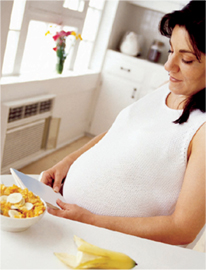If you’ve been following Positive Parenting Magazine’s articles on diet and nutrition, you’ll know by now that the traditional ‘eat for two’ diet for pregnancy is inaccurate. Technically, you are eating for two – but don’t forget, this new ‘second person’ is very much smaller than you!
How much weight should I gain?
On average, women who weigh within the healthy range for their height should gain about 12.5 kg over the course of the whole pregnancy.
Overall, you should gain 0.5 kg per month for the first five months and 0.5 kg per week for the remainder of the pregnancy. Consult your obstetrician or a dietitian for advice on what and how much to eat in order to achieve this weight gain.
Maternal overweight is associated with birth defects, especially neural tube defects; labor and delivery complications; foetal and neonatal death; maternal hypertension, diabetes; and delivery of large-forgestational- age infants. Gaining too little weight, on the other hand, may put him at risk of premature birth and low birth weight.
Now that you know you aren’t supposed to double your food intake for pregnancy, consider the following tips for gaining weight at a healthy rate in pregnancy:
- If just before conceiving you were outside the healthy weight range, ie overweight or underweight, bear in mind that you will need to gain less or more than the amount recommended above. A dietitian will be able to help you formulate a diet plan that will ensure you gain the right amount of weight.
- Eat a balanced diet with plenty of fresh fruits and vegetables, accompanied with at least 2 cups of low-fat milk daily (or the equivalent in dairy products, eg cheese and yoghurt).
- Prevent heartburn and gastric attacks by having healthful snacks between meals, or just having smaller meals at more frequent intervals.
- If you are often nauseous and vomit frequently, make up for the fluids lost by drinking water, unsweetened freshly squeezed fruit juice or milk.
- Monitor your weight gain at home by weighing yourself once or twice a week at about the same time of day, ie just before breakfast or before going to bed. Wear lightweight clothes and use the same scale each time.
Important: If you have suddenly gained more weight than usual and feel abnormally bloated, call your doctor. Water retention is a normal part of pregnancy, but it can also indicate pre-eclampsia, a condition of high blood pressure in pregnancy that needs medical attention.
Where the extra weight goes
You may wonder why you gain so much weight when, at the end of the day, baby will only weigh about 3 kg or so. This is where the rest of your weight gain goes:
- Placenta, a unique organ in the uterus that connects baby to you and enables you to supply him with everything he needs to grow. Soon after baby’s birth, the now obsolete placenta will be expelled from your body.
- Amniotic fluid, a clear water-like substance in which baby is suspended during pregnancy. It helps support baby’s body and protects him from injury when you move around or are suddenly jolted.
- Breast tissue, which expands in preparation for breastfeeding.
- Blood supply, which must increase in order to meet both your needs. As your body grows larger, you need more blood to circulate in your own body. And as baby grows and develops, he needs more and more, too.
- Fat stores – these are the body’s most efficient source of energy, which it will need very much when the time comes for you to deliver. Breast milk also contains a lot of fat, which is taken from the ‘stocks’ your body is now saving up.
- Uterus expansion, a necessary part of pregnancy. As baby grows bigger, the uterus also ‘grows’ to accommodate his size. This results in a corresponding gain in weight.
All of these are reasons why you should not try to prevent gaining weight while pregnant. If you limit your intake of certain foods, you may be affecting baby’s development or your body may compensate by contributing its stores to baby instead.







Comments